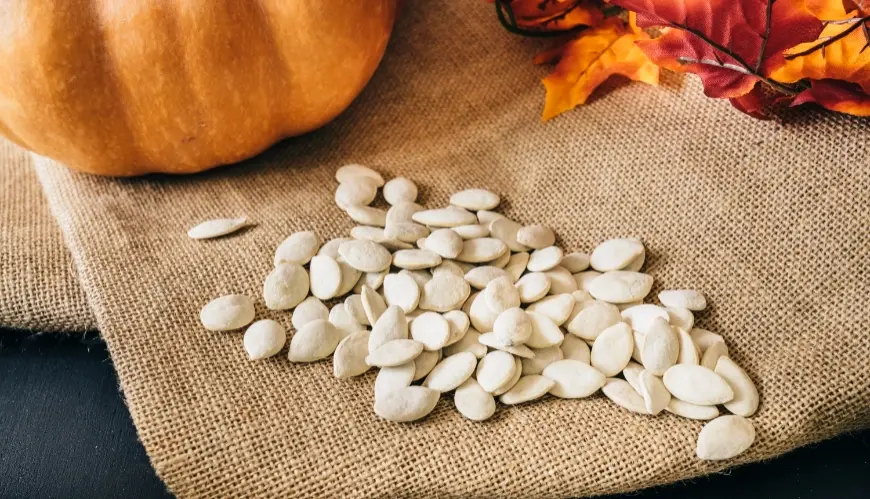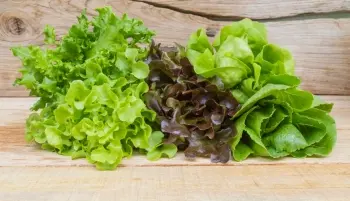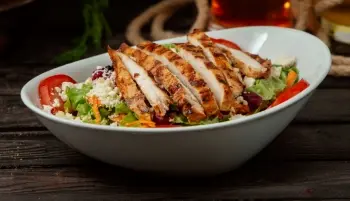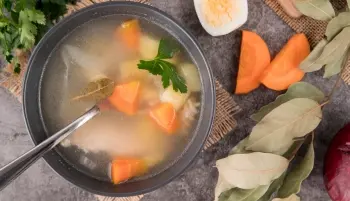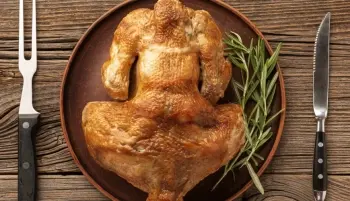With a set of robust nutritional benefits, pumpkin seeds are excellent for consumption, whether raw, sprouted or cooked. Although the risks associated with these seeds are low, certain conditions might lead to adverse health impacts when consuming them.
Explore whether pumpkin seed toxicity is a real concern, the potential unfavorable effects of pumpkin seeds and also learn the circumstances that warrant consulting your doctor if they cause discomfort.
Tip
In most cases, consuming raw pumpkin seeds is regarded secure. However, there are chances of experiencing an allergic reaction or contracting foodborne illnesses from these snacks.
Is it Beneficial to Consume Raw Pumpkin Seeds?
In brief, the Cleveland Clinic affirms that raw pumpkin seeds can be very healthy for you.
As disclosed by the U.S. Department of Agriculture (USDA), these seeds pack a high quantity of necessary nutrients crucial for your body's optimal performance:
Nutrient Composition of 1 oz Unsalted, Roasted Pumpkin Seeds
- Calories: 126
- Protein: 5.3g
- Fat: 5.5g
- Carbs:15.3g
- Fiber:5.2 g
- Magnesium:74.3mg
Source(s): USDA
Enjoy them in their natural state with or without shells; alternatively, you could roast them for a crispier snack option.
Consider sprouted pumpkin seeds as well - according to the Cleveland Clinic, they are enriched with more vitamins, minerals, fiber and antioxidants.
Possible Adverse Reactions from Consuming Pumpkin Seeds
Even though there aren't any particular risks associated with pumpkin seeds, one can suffer an adverse reaction if they have an allergy or consume a spoiled batch. Other drawbacks of consuming pumpkin seeds are relatively few.
Below are some potential negative impacts in relation to pumpkin seed consumption:
1. Issues Related to Digestion
Consuming pumpkin seeds will provide a good dose of fiber, which is essential for a balanced diet. However, an excessive intake could lead to various digestive problems like:
- Excess Gas
- An uncomfortable feeling of bloating
- Constipation
- Diarrhea
- Pain and cramps in the stomach
Chances are you've noticed undigested pumpkin seeds showing up in your stools before. This phenomena isn't limited just to pumpkin seeds but can happen with other food items as well such as corn kernels, various kinds of seeds and nuts. Foods high in fiber sometimes don't get completely broken down or absorbed when they pass through your digestive system. According to information from Mayo Clinic, this can be a normal occurrence.
2. Contamination Caused by Food
Although pumpkin seeds aren't toxic, when spoiled they might lead to foodborne illness.
Moreover, germinated pumpkin seeds among other sprouted seeds contribute a risk of bacterial contamination, as per the Cleveland Clinic's explanations. Despite not being inherently harmful or noxious, these sprouts cultivate in humid and warm climates that are prime for fostering detrimental bacteria like E.coli or Salmonella.
As stated by Mayo Clinic, food poisoning can materialize hours to days post-ingestion of tainted food and potentially last several days with symptoms such as:
- Nausea
- Vomiting
- Diarrhea
- Abdominal pain
- Fever
How do you determine if pumpkin seeds have turned bad? Unfortunately, one can't discern if the pumpkin seeds are spoiled solely by their appearance.
Rather than relying on sight alone for identifying spoiling signs on these edibles; it is advised to cook the seedlings thoroughly for exterminating any possible threatening bacteria present from Cleveland Clinic's viewpoints.
3. Reaction Due To Allergy
Those with a known allergy to pumpkin seeds should refrain from consuming them. Display of symptoms can occur moments to hours following ingestion of these seeds for those allergic- this information is shared by the University of Nebraska-Lincoln.
According to the Mayo Clinic, indications that you are experiencing an food allergy encompass:
- A prickling or itching sensation in the mouth
- Skin conditions such as hives and eczema
- Swelling observed in areas like lips, tongue, mouth or throat
- Nose blockage problems
- Signs of difficulty in proper breathing or wheezing
- Stomach-related complications like stomachache, nausea or vomiting events
- Instances of feeling dizzy
Alert
Some individuals may suffer from a severe, potentially deadly allergy-induced reaction known as anaphylaxis. According to Mayo Clinic, during this reaction, the throat can constrict and cause serious breathing difficulties. If you find yourself or someone else in such a situation and have access to an EpiPen, use it right away then dial 911 without delay.
4. Reduced Mineral Uptake
Uncooked pumpkin seeds carry anti-nutrients such as phytic acid, inherent compounds that could potentially undermine the absorption of necessary minerals according to Harvard T.H. Chan School of Public Health.
Nevertheless, the amount of phytic acid ingested from consuming pumpkin seeds as part of a comprehensive diet is not perceived to interfere significantly with your overall nutrition, based on a September 2020 study found in Nutrients. Interestingly enough, this piece points out that phytic acid could also have antioxidant characteristics lending protection to your cells against harm.
Consult with a Physician
In cases where ingesting a substantial amount of pumpkin seeds results in reactions such as gastrointestinal distress, it may not always require an appointment with your healthcare provider. You might just have to reduce the quantity you consume, or abstain from them altogether.
Nevertheless, if consumption of these seeds triggers intense allergic responses or persistent symptoms resembling food poisoning beyond 24h, reaching out to your doctor is advised. Your physician can identify whether these symptoms are related to the ingestion of pumpkin seeds and propose therapeutic solutions or strategies to prevent future occurrences.
Moreover, it's important for you note that there's no condition known as "pumpkin seed poisoning." As a matter of fact, pumpkin seeds are packed full of nutrients — making them a tasty and beneficial snack option. It would only be necessary to avoid consuming them if they trigger allergies or agitate your stomach.
Frequently Asked Questions
What could be the reason for my throat pain post consumption of pumpkin seeds?
In certain cases, your throat might experience discomfort after consuming pumpkin seeds due to a scratch made by a seed piece while you swallowed it. If no other symptoms accompany this discomfort, it is advisable to drink water or any other liquid as this can help alleviate the pain caused by the scratch.
However, if you observe additional symptoms like tightness in your throat, swelling and difficulty in breathing along with soreness in your throat then these could indicate a severe allergic reaction that requires immediate medical consultation and intervention.
Is it possible for pumpkin seeds to lead to intestinal obstruction?
Although exceedingly uncommon, there have been a couple of instances where consumption of pumpkin seeds resulted in an intestinal blockage as per a study published in March 2017 by the ACG Case Reports Journal. Such occurrences were due only because an excessively large amount of pumpkin seeds was consumed at once and wasn't adequately chewed or digested. If you maintain an appropriate intake of these seeds on a daily basis, it's highly unlikely that they will result in any form of intestinal obstruction.
Is it safe to consume pumpkin seed husks?
As it turns out, not only is consuming pumpkin seed shells void of harm; rather its deemed healthful according to the Cleveland Clinic. These husks serve as a rich source of dietary fiber and can be conveniently roasted in an oven or lightly sautéed on a stovetop. It's worth noting though that some commercial varieties of whole pumpkin seeds are often high in sodium content. For those who maintain low-sodium diets, unsalted packaged alternatives are recommended or alternatively making them at home sans shell.
